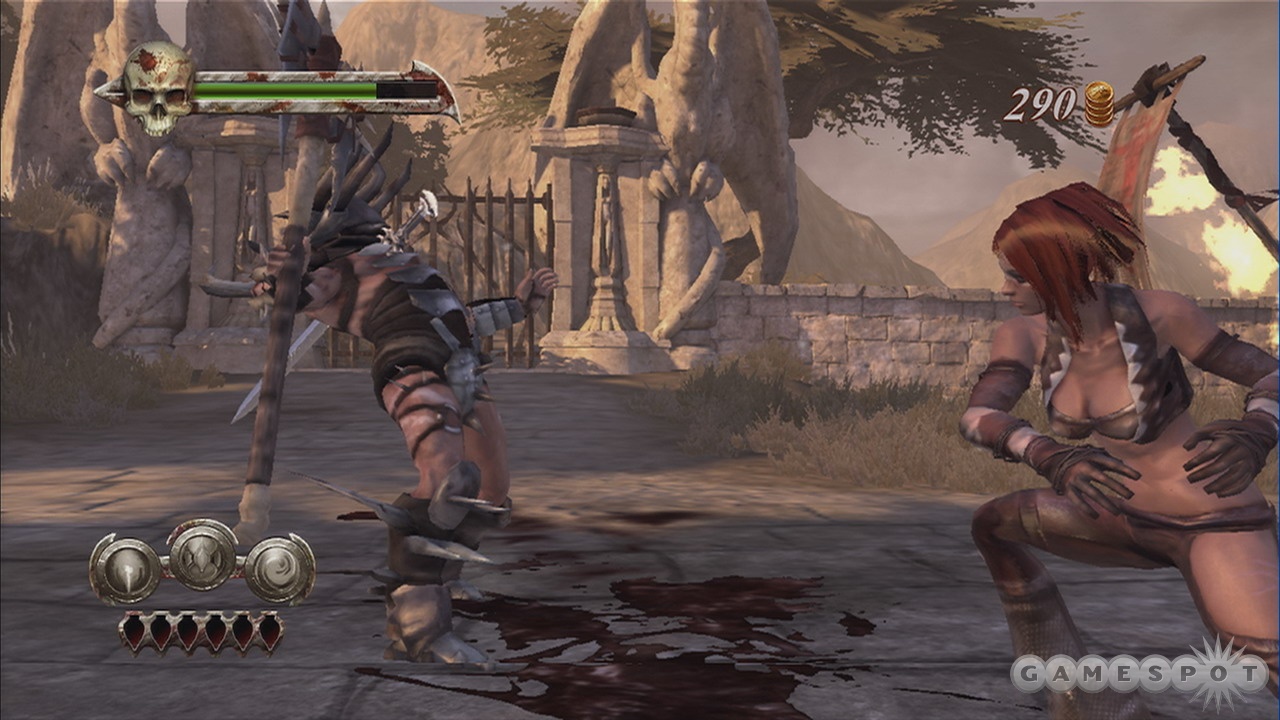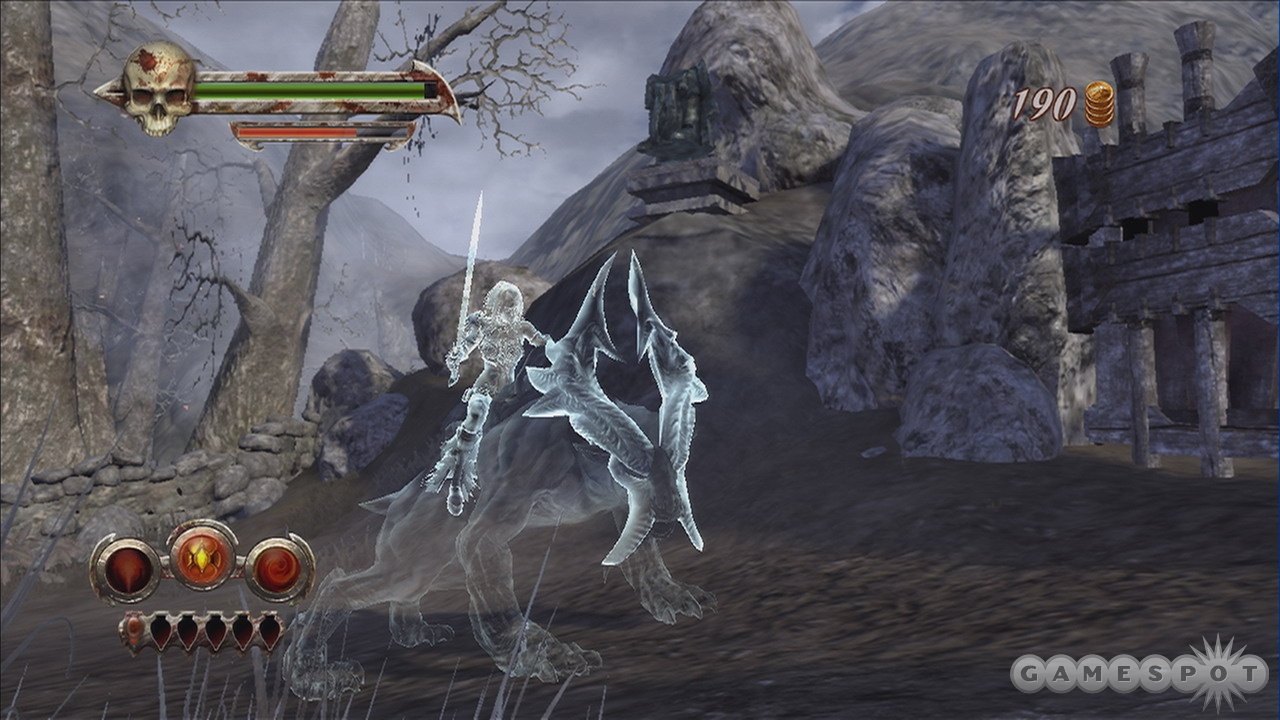A flashy hero with formidable combat skills sets off on an epic adventure through fantastical environments. Sound familiar? These basic elements are the framework upon which countless action adventure games have been constructed. While many games seem to expand and embellish far beyond this rudimentary foundation, Golden Axe: Beast Rider does not. All of these elements are functional at best, and even the one stab at originality, the eponymous beast riding, is merely average. The result is a disappointing game that, while not broken per se, is so thick with in-your-face mediocrity that the only thing you'll take away from it is the strong desire to play something else.
The face of Golden Axe is Tyris Flare, a woman who, reprising her role from the original Golden Axe, wears an outfit is every bit as fantastical and cliched as the adventure she embarks on. On her journey to avenge the slaughter of her people and slay the archfiend Death Adder (or Death=Adder, if you prefer the erratically used alternate spelling), Tyris will travel through rocky mountains and dry wastelands peppered with enemy strongholds. The limited color palette gives most of the levels a similar feel, though the ancient ruins and massive scenic elements (like the bones of giant beasts) add a bit of variety. Any immersion the setting might engender is negated when you realize that Beast Rider has more invisible walls than a mime convention. At best, these barriers will put a disappointing end to your exploration; at worst, they will shunt you off cliffs or into environmental hazards. So, your adventure ends up being very linear, and the occasionally interesting scenery you’ll see really doesn’t do much to help.

Most of your attention will be focused on the myriad enemies you'll be hacking apart. Gory deaths are the order of the day in Golden Axe, and when you land a death blow you'll often chop off arms, legs, heads and torsos and be rewarded with geysers of blood. This can be quite satisfying, but the limbs pop off with an incongruously muted clipping sound, and the blood and bodies soon disappear, leaving no evidence of your passing. Once the dust has settled, your only reward is tribute (points, essentially) that goes towards unlocking a few spell upgrades, as well as new swords that can be used when replaying levels. You can increase the tribute you earn by fighting flawlessly, but saying this is difficult would be an understatement.
Beast Rider is not an easy game. Many enemies can be dispatched with a flurry of quick and strong attacks, but you'll need to work in blocks and parries if you hope to survive tougher encounters. When enemies attack you, their weapons flash with a colored light. Blue strikes must be blocked, while orange strikes must be parried. These evasion moves are not interchangeable, so parrying a blue attack will get you a face full of sword. Attacking directly after a successful evasion will do much more damage, and it's the ebb and flow of evade and strike that makes combat initially engaging. These maneuvers can also trigger particularly brutal counters, though the unclear timing and precision requirements make these a frustrating rarity.
Against more difficult foes, post-evasion strikes are the only effective way to deal damage. Tough foes will be armored, which means your attacks will not interrupt theirs until you manage to chop away their protection. To weaken them, you'll want to attack, but while straight-on assaults may work with lazier enemies, they are tantamount to suicide when facing vigorous foes. It's like this: Though you can theoretically interrupt your own combos with evasions to avoid your enemy's strikes, you can't reliably interrupt your own attack animations, so you're sure to get slammed if you go in swinging. This means you are better off just waiting for your enemy to attack you and then evading and countering. What kind of action game rewards running up to your opponents and standing still? To make matters worse, the spotty enemy AI will sometimes wait for you to attack first, so you can find yourself hanging around with a bunch of murderous goons waiting for someone to make the first move. There's certainly a challenge in restraining yourself, perfecting your evasion timing, and trying for high tribute bonuses, but just because it's hard doesn't mean it's fun.

Magic is also a reliable way to dispatch foes, but mana refills are rare enough that you won't be able to use your spells too often. Thankfully, beasts are more prevalent, and you'll spend a good amount of time clomping around on the backs of these hulking monsters. Each can be easily mounted with the press of a button, but you'll often have to unseat enemy riders first. Your best bet here is a jump kick; attacking the beast directly can force it to throw its rider, but then you'll be mounting a weakened animal who is closer to gory, blood-spouting death. Setting your enemies alight with the fire-breathing Abrax or tearing through a large group of unsuspecting enemies with the Lynth can be quite satisfying, but using some of the beasts' special attacks will drain their health. Still, these powerful maneuvers are helpful in a pinch, and using a berserk Mirigore to rend everyone limb from limb is some of the best fun Beast Rider has to offer.
Unfortunately, these thrills are tempered by the fact that every beast sounds and handles like a giant, clunky robot. This awkwardness forces you to attack in very specific and limited ways, especially when confronting the aforementioned armored foes whose attacks will still proceed unblocked even when five tons of Krommath comes crashing down on their heads. Though these bungling beasts offer a few moments of fun, they ultimately add to the feeling that the whole game was a missed opportunity.
At the very least, the campaign is fairly lengthy and will likely take you upward of 10 hours to complete. There are level-by-level replays and combat arenas if you want still more action, but these bonus modes only highlight the conspicuous absence of the cooperative play that put Golden Axe on the map back in 1989. This baffling omission is par for the course in Beast Rider, a game with lofty potential that ends up wallowing in mediocrity.



